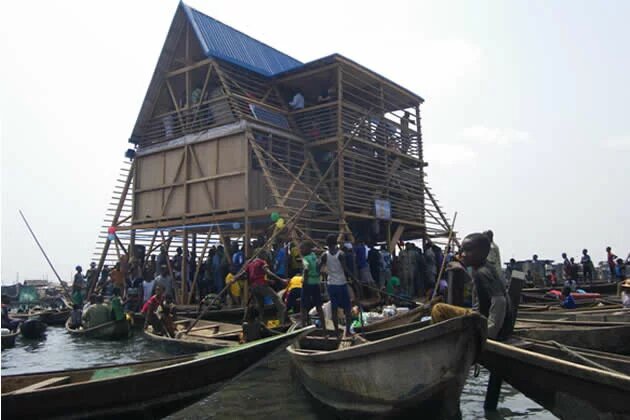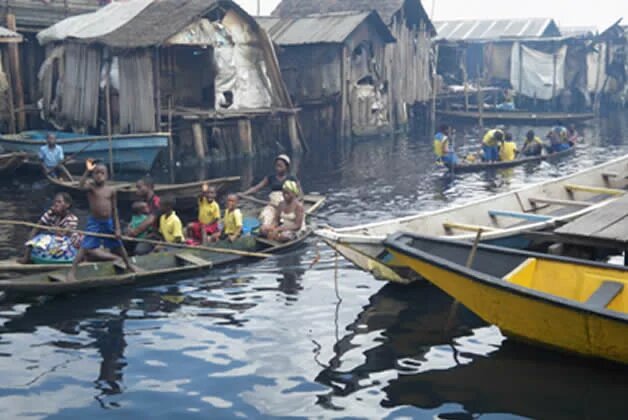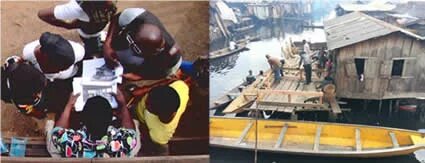

Africa, the most vulnerable continent to experience the devastating consequences of climate change, has undergone rapid urban development during the last decades. While several nodal cities, such as Lagos, Nigeria, have experienced rapid urban growth, the quality of life for most of its challenged informal settlements has not seen significant improvements. Due to the impact of climate change; rising sea levels, increased rainfall and flooding are becoming day-to-day reality, while modern infrastructure seems unavailable when it comes to informal settlements, such as Makoko, in Lagos. The essence of Makoko offers challenges yet solutions to the problems of overprized land, housing shortage and flooding. At the same time, it requires improvements and developments. NLÉ has committed to enrich this collective and spontaneous effort with expertise in the field of innovative and adaptable architectural and urban solutions. The pilot project of ‘Makoko Floating School’ was launched in 2010 and has stimulated the local community and Lagos state to engage in a long-term participatory design process for a school project and new ways of building and living on water. Starting in Makoko with the support of hbs, UNDP/Federal Ministry of the Environment & AAP, NLÉ has taken action and completed a prototype, the Makoko Floating School, in March 2013. A period of testing and evaluation followed its construction, from April to September 2013, while its official operation as an education venue is expected before the end of this year. Makoko Floating School has employed locally sourced and adaptive technologies to create sustainable and empowering design solutions. Its iconic and functional design has made it a recognizable landmark in Lagos state and a growing identity and voice for the community, while stressing the importance of climate resilience solutions. Makoko Floating School’s replicability and scalability has also been acknowledged through country and continent wide interest in developing iterative solutions that are indigenous, adaptable and mobile for other waterfront communities, such as at the Delta State. This first indigenous iteration is an ongoing participatory design process of an 'amphibious building' - a community radio station - for a waterfront community in Port Harcourt, Rivers state. This new building will host a cultural, educational and community media platform, called Chicoco Radio.
Moreover, the challenges that Makoko Floating School Project has responded to and faced has been even more variant than the ones mentioned. Developing climate resilient strategies for waterfront communities requires considerable innovation and expertise on a state level as well. “A legislative framework that “emphasises good governance, responsibility, leadership and practical initiatives for local governments, communities and citizens” must be employed to reach such a goal. The project has therefore depicted the complexity of the policy landscape in Nigeria, since it required the state government to be convinced to offer support and be engaged in a meaningful manner in the process. As Lagos State Government designated the area of its waterfront as imperative of development, the informal settlement of Makoko recently faced short notice eviction.
Eviction exercise in Makoko community in June 2012 – photos by Aderemi AdegbiteThe design, participatory process and research initiated by NLÉ has challenged the standards of what sustainable development, climate change resilience and adaptation solutions mean for Lagos state. Overall, Makoko Floating School has also suggested a new development strategy that responds to the increasing problem of land reclamation due to climate change and has proposed an innovative approach to spatial planning on water, while setting the base for creative engagement of the government authorities in such sustainable efforts.
However, Makoko Floating School was not only destined as an innovation for addressing challenges of urbanization and climate change problems but more importantly as a means to stress the need for a rounded and interdisciplinary approach and thinking to urban planning and policy making. It encourages the integration of a variety of fields’ expertise, such as in transportation, energy, sanitation and water management policies.
Traffic in Makoko community
In the words of Lagos State Governor, Babatunde Fashola, at the 5th Lagos Climate Change Summit, “it is a war we need to fight together and I am sure that if we fight together, the human civilization will win, climate change is not new, what is new is our knowledge about it and what we do about it’’. Makoko Floating School has therefore achieved to stress the necessity the State Government has to provide the private sector an enabling environment to aggressively pursue mitigation and adaptation initiatives in the interest of green development.
As far as the impact of the research project of ‘African Water Cities’ is concerned, NLÉ has received worldwide academic and individual interest. NLÉ’s invited participation at the MoMA biannual exhibition and workshop, as part of one of the research teams, has been a highlight and opportunity. The workshop and exhibition titled “Uneven Growth” seeks to challenge current assumptions about the relationships between formal and informal, bottom-up and top-down urban development” where the possibilities of progressive and sustainable urban planning in partnership with international urban planners are discussed and investigated. Currently the body and interest of the research continues and grows to include more cities and communities, such as Luanda, Angola; Ganvié, Benin; Capetown, South Africa; as well as Nzulenzu, Ghana; attracting partnerships with parties sharing similar interest in progressive responses to climate change resilience in African cities.
The primary focus of NLÈ’s research and Floating School project has been to contribute to climate change resilient strategies. To start with, this has been achieved by the project’s inherent community empowerment and capacity building practice. Makoko Floating School aimed not only to empower the community with skills, but also allowed locals to directly engage with other project partners and stakeholders e.g. UNDP, Heinrich Boll Foundation, Lagos State Government representatives. That way the local culture of living and working on water was introduced to an extensive interaction with an empowering platform of stakeholders and partners who can further enable plans for future community development. More importantly, however, the participatory design process involved the understanding and integration of local expertise. The floating school was built with locally available materials, labour and vernacular building techniques that were combined with existing relevant global technologies.
Community research and construction work – photos by NLEThis integrative approach resulted in the creation of a building fully responsive to the needs of an aquatic environment. Furthermore, local knowledge of environmental and climatic patterns, such as tidal variations and rainfall patterns, as well as economic and industrial potential of local aqua cultures, such as fish farming, provided the necessary insights into the project’s context. As described by the UN definition, ‘sustainability implies responsibility for the social, environmental and economic needs of the present without compromising opportunities for future generations’. The community’s involvement not only in the conceptual development but also construction and on-going maintenance of the building therefore represented the essence of sustainable urban development, enabling the local community to replicate and further adapt the design of the building to meet their present and future needs.
Read the full article
The chapters of the full report on Makoko's architectural, town planning and social housing solutions, can be downloaded here.
Report by Kunle Adeyemi, founder of NLE
Chapter 1: Urban and infrastructural issues
- 1A: Challenges and conditions
- 1B: How Makoko is perceived
- 1C: Life in Makoko
- 1D: Project location and access
- 1E: Sanitation, sewage and waste disposal
Chapter 2: Architectural research of appropriate builiding technologies
- 2A: Makoko Building Techniques: Learning From Makoko
-
2C: Building Materials Supply, Local Availability and Durability
Chapter 3: Social, cultural and educational needs of the school and building use
Chapter 4: Land and water use, regulations and policies

